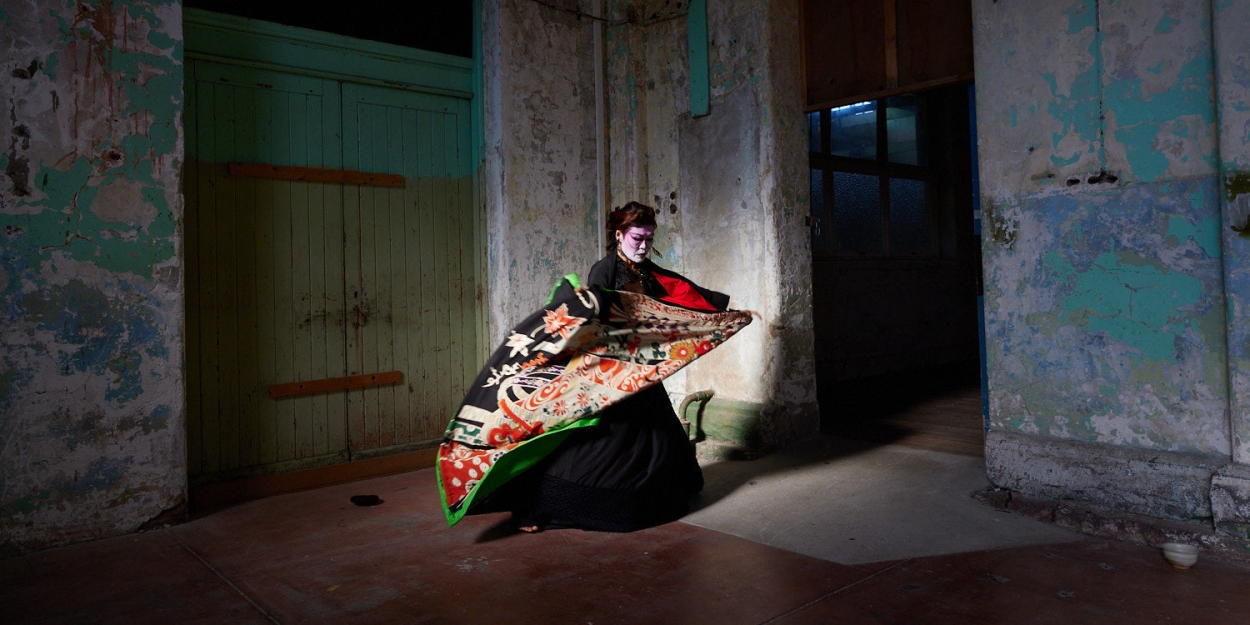Review: BURIED TEABOWL – OKUNI – OZASIA FESTIVAL 2023 at Nexus Arts
Butoh meets Kabuki, as modern meets ancient.

Reviewed by Barry Lenny, Sunday 29th October 2023.
Buried Teabowl – OKUNI is a solo performance by Butoh practitioner, Yumi Umiumare, inspired by the work of Izumo no Okuni who, in the early 1600s, originated Kabuki theatre. The tea ceremony became important around the same time. Yumi Umiumare is an innovator, extending her work in Butoh, and creating Butoh Cabaret, and she brings together Okuni and tea in a packed ninety-minute performance.
Umiumare arrives and slips on a western style dress then, with stylised movements, pushes a tea trolley around, sets a chair beside it, collects cups and saucers and arranges them with careful precision, then pours several cups of tea to go with some Madeleines. She gives a cup of tea to one audience member, and a Madeleine to another, then eats and drinks, announcing that a Madeleine and a cup of tea help you to remember.
The performance that follows is as multifaceted as Umiumare herself, wide-ranging in its content and incorporating projected videos, multiple costume changes, powerful feminist influences, soundscapes, a broad range of music, Japanese hip hop, and personal introspective.
There is an added bonus, the intricate ritual of a traditional tea ceremony, explained step-by-step, with one member of the audience being brought onto the stage to sample the finished tea. This takes place in a cubic structure with a Japanese white paper screen at the rear, which serves as another video screen. She then has the audience go through the motions of handling and drinking tea, imagining that we have cups in our hands.
She produced a tea bowl given to her by her father, who died three years ago. It had been broken and repaired using a technique known as kintsugi (golden joinery), using urushi (lacquer) mixed with powdered gold. This led to her telling a very personal story of how she conducted a tea ceremony for her family, and how she danced in his honour at his funeral.
There was, of course, much dancing, along with wordless vocals and singing, including a sing-along in Japanese, and some audience members joining her to dance onstage. There were many joyous moments alongside the serious and the poignant in this celebration of female power, the goddess within, strength within a fragile frame.
Umiumare has some very impressive helpers. This production boasts dramaturgy by Maude Davey, and Moira Finucane is credited as provocateur. It is a solo performance, but a big team was involved in bringing it to the stage. Projected videos are by Takeshi Kondo, music and soundscapes are by Dan West, and the lighting design is by Emma Lockhart-Wilson.
Noriko Tadano provided the Shamisen music in one of the video segments, and another video included performers Kayo Tamura (Director of the wonderful Theatre Group Gumbo) and Kyoko Amara, from Japan. Yumi Umiumare, Rose Chong, Haru Ogiso, and Kiki Ando were responsible for the many costumes used during the performance, from modern Western to Japanese traditional.
Like the repaired bowl, there was pure gold holding together all of the diverse components of this performance. That gold was Yumi Umiumare.
Photography, Vikk Shayen.
Reader Reviews

Videos

